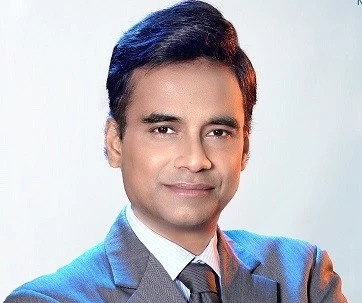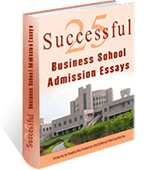
Client rejected by Chicago Booth
If you could pick the one quality that characterizes a good leader, which would you choose and why? (350 words)
Leaders take initiative to implement a change in their organization. Nothing demonstrates good leadership skills as effectively as the process of initiating change. Throughout my career, I have embarked on multiple initiatives to drive home the necessary change.
For instance, while working for TCS, I was astounded by the dearth of information among the employees regarding the various innovative advances in software development. After recognizing this gap, I envisioned TCSyntelligence, a monthly newsletter to feature news of industry-wide innovative and cutting edge research. I created a template, selected appropriate categories of news, and identified authentic news sources. From the initial issue, the feedback was overwhelmingly positive. The distribution of TCSyntelligence grew from ten to two thousands within a year, demonstrating its relevance and success. TCSyntelligence equipped the management with thorough knowledge about various innovations. It also earned me the tag “resident expert on innovation”.
Another such instance, while a project Lead in Amex, I experienced the absence of a proper risk management tool which motivated me to develop a risk management portal to identify, evaluate, and track all project related risks. This web based tool helps to categorize risks, measure their probability, severity and impact, develop specific counter-measures to address the identified risks and review them periodically. This user friendly tool has been such a huge success that our Quality Process Group labeled it the “Best Innovative Tool of 2009” and consequently, the management mandated its use in all projects across the entire company!
Yet another startling episode at Amex was when I initiated a project to automate the report generation system thereby reducing the production time of various critical business reports by 90%, operational cost by 30% and obviating the chances of manual mistakes. This value added service was such an immense success that our team won critical acclaim from the Director of Amex! In return, he awarded the Claim Processing Automation contract worth $575,000 to our organization.
The above mentioned instances are striking examples of my inherent ability to take initiatives, ensure execution and achieve outstanding results.
The Admission Committee asked about one leadership quality that the applicant admires. So the applicant was required to select one aspect of leadership and explain the reason behind his selection. This was a golden opportunity for any applicant to illustrate his maturity as a leader and in-depth understanding on managerial issue. He selected “initiative” as the most desired skill and straightway started to elaborate the various instances in his career when he took initiative. Where is the explanation about why he choose initiative and not something else? He offered only one line reasoning – “Nothing demonstrates good leadership skills as effectively as the process of initiating change.” That’s all. But it’s not sufficient.
He offered no rational about why he thinks initiative is better virtue than all other leadership qualities such as teamwork, envisioning a goal, motivating people, communicating the vision to employees, handling inter-departmental or personality conflicts and so on. He could have offered examples of great corporate leaders such as Steve Jobs who changed the way Apple used to work or Jack Welch’s initiative to fundamentally change GE after becoming its CEO. He could have also given example from the world of politics or economics to substantiate the point that initiative, in his opinion, is a better virtue than others leadership qualities. From Mustafa Kamal Ataturk in Turkey, Mahatma Gandhi in India, Nelson Mandela in South Africa to Deng Xiaoping in People’s Republic in China, all great political leaders have initiated fundamental socio-economic changes in their countries. Hence, there is a million way to substantiate the reason behind selecting initiative before writing the instances in which he took initiative. And that’s the biggest disconnect in this essay. Overall, this essay portray poor thought process of the writter. Even though he has mentioned about talking initiatives and solving problems in global companies, he has not given much thought about what to write in this essay.
Check the Leadership in Professional Career essay that we developed for one of our MIT Sloan client. Even though the essay topic is different, you can review the essay to understand the intellectual maturity and in-depth insights of the writer. MBA programs are leadership programs. ADCOM officers are looking for leadership qualities among the applicants. Hence they ask for 2~3 application essays in order to evaluate applicants’ intellectual horsepower and leadership maturity. There is no fixed formula to write the essays. But ultimately the essays need to project you as a budding leader in the corporate world and show ADCOM that you are a far better leader than other applicants. Hence, applicants need to do a lot of brainstorming in order to decide what to write in the first place.
Out of so many things that you have done in your professional career, which instances do you need to pick? And moreover, how that story should be connected with the larger theme of leadership? Once you finalize the answers of these questions, articulating those stories in effective English language is a far easier job. But most of the applicants just go wrong in the first step. They don’t ponder much about “what to write” in order to demonstrate their leadership maturity. Instead they think more about “how to write it” i.e. presenting their essays in a polished language. Remember, you are not applying for Masters in English in Oxford University. You are applying to a leadership program. Hence “what you write” is far more important than “how you write it”.
Don’t submit essays that are wonderfully written but fundamentally flawed in thinking. As only 10% of the applicants are accepted in top ranked MBA programs, such poorly designed essays will not take you anywhere.

Click here to review my clients’ feedbacks, including video testimonials!






